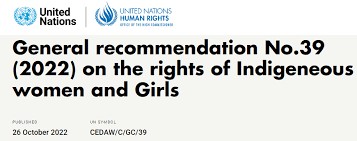
https://www.internationaldisabilityalliance.org/blog/cedaw-committee-ado...
Jointly with the Indigenous Persons with Disabilities Global Network (IPWDGN), the International Disability Alliance actively engaged in the process leading to this general comment engaging at each stage open for participation. This included the two following written submissions:
- Submission for the CEDAW Committee Day of General Discussion on the Rights of Indigenous Women and Girls (June 2021) in PDF or Word
- Submission on the CEDAW Committee’s Draft General Recommendation on Indigenous Women and Girls (January 2021) in PDF or Word
IDA highly welcomes the outstanding level of inclusiveness of indigenous women and girls with disabilities. The general recommendation includes 30 (thirty) references to disability and to indigenous women and girls with disabilities. Indeed, when referring to non-discrimination and intersectionality, the CEDAW Committee includes “disability” among the many grounds of discrimination and/or layer of identities involved (See paragraphs 2, 3, 4, 16 and 17).
Focusing more on issues specific to indigenous women and girls with disabilities, the CEDAW Committee “highlights in particular the gravity of discrimination and gender-based violence against Indigenous Women and Girls with disabilities living in institutions” (paragraph 9) and stress that “[i]ndigenous women with disabilities commonly experience the denial of legal capacity which leads to further human rights violations in areas such as access to justice, institutionalized violence, and forced sterilization” (paragraph 9). Throughout the text, there are many specific recommendations to States on indigenous women and girls with disabilities, which denote the influence of human rights standards and concepts enshrined in the Convention on the Rights of Persons with Disabilities, of which only four salient ones are exposed below:
- “Ensure that Indigenous Women are equal before the law and have equal capacity to conclude contracts, administer, and inherit property. States Parties should ensure the recognition of legal capacity for Indigenous Women with disabilities and support mechanisms for the exercise of legal capacity;” (para 23(d));
- “Information should also be made available for Indigenous Women and Girls with disabilities in formats such as braille, easy read, sign language, and other modes.” (para 23(f));
- “Ensure equal access to justice for all Indigenous Women and Girls, including through the provision of procedural accommodations and adjustments for those who need them due to age, disability or illness, which may include sign language interpretation and other communication support and longer timeframes for submissions” (para. 33(e));
- “Repeal all laws that prevent or deter Indigenous Women and Girls from reporting gender-based violence, such as guardianship laws that deprive women of legal capacity or restrict the ability of women with disabilities to testify in court (para. 42(d)).”










Add new comment